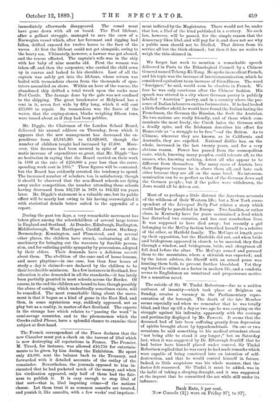We forgot last week to mention a remarkable speech delivered
in Paris to the Ethnological Council by a Chinese General named Tcheng-Ki-Tong. He spoke in excellent French, and his topic was the increase of intercommunication, which he considered equivalent to an increase of friendliness. The word "foreigner," he said, would soon be obsolete in French. We fear he was only courteous after the Chinese fashion. His speech was uttered in a city where German poetry is publicly labelled " Austrian " poetry, and in a country where the pre- sence of Italian labourers excites furious riots. If he had looked a little further afield, he would have found the Italian hating the Frenchman, the German the Russian, the Serb the Austrian. No two nations are really friendly, and of those which com- municate the most freely, the Czech hates the German with a deadly spite, and the Irishman describes his effort for Home-rule as "a struggle to be free "—of the Briton. As to Chinese, wherever they are known, as in California and Australia, they are expelled. National dislike has, on the whole, increased in the last twenty years, and for a very obvious reason. Power has passed from the cosmopolitan caste, which, knowing many peoples, could tolerate all, to the masses, who, knowing nothing, detest all who appear to be different from themselves. The many races of Austria love their Emperor because he is above them all, and hate each other because they are all on the same level. No intercom- munication can be so perfect as that of the German Jews and the German people ; but if the police were withdrawn, the Jews would all be driven out.


















































 Previous page
Previous page